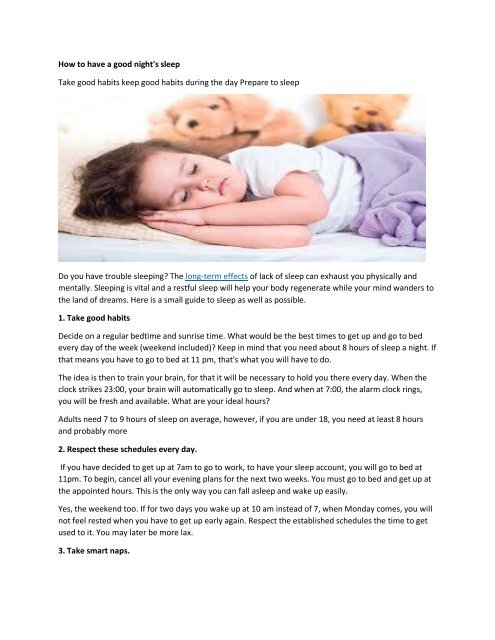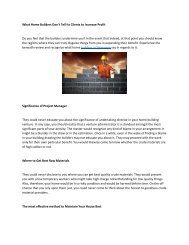How to have a good night's sleep
Putting you to bed could automatically launch your brain on the list of things you have to do. Make sure to keep these two worlds separate. Book your bed for good night sleep and pleasure.
Putting you to bed could automatically launch your brain on the list of things you have to do. Make sure to keep these two worlds separate. Book your bed for good night sleep and pleasure.
You also want an ePaper? Increase the reach of your titles
YUMPU automatically turns print PDFs into web optimized ePapers that Google loves.
<strong>How</strong> <strong>to</strong> <strong>have</strong> a <strong>good</strong> <strong>night's</strong> <strong>sleep</strong><br />
Take <strong>good</strong> habits keep <strong>good</strong> habits during the day Prepare <strong>to</strong> <strong>sleep</strong><br />
Do you <strong>have</strong> trouble <strong>sleep</strong>ing? The long-term effects of lack of <strong>sleep</strong> can exhaust you physically and<br />
mentally. Sleeping is vital and a restful <strong>sleep</strong> will help your body regenerate while your mind wanders <strong>to</strong><br />
the land of dreams. Here is a small guide <strong>to</strong> <strong>sleep</strong> as well as possible.<br />
1. Take <strong>good</strong> habits<br />
Decide on a regular bedtime and sunrise time. What would be the best times <strong>to</strong> get up and go <strong>to</strong> bed<br />
every day of the week (weekend included)? Keep in mind that you need about 8 hours of <strong>sleep</strong> a night. If<br />
that means you <strong>have</strong> <strong>to</strong> go <strong>to</strong> bed at 11 pm, that's what you will <strong>have</strong> <strong>to</strong> do.<br />
The idea is then <strong>to</strong> train your brain, for that it will be necessary <strong>to</strong> hold you there every day. When the<br />
clock strikes 23:00, your brain will au<strong>to</strong>matically go <strong>to</strong> <strong>sleep</strong>. And when at 7:00, the alarm clock rings,<br />
you will be fresh and available. What are your ideal hours?<br />
Adults need 7 <strong>to</strong> 9 hours of <strong>sleep</strong> on average, however, if you are under 18, you need at least 8 hours<br />
and probably more<br />
2. Respect these schedules every day.<br />
If you <strong>have</strong> decided <strong>to</strong> get up at 7am <strong>to</strong> go <strong>to</strong> work, <strong>to</strong> <strong>have</strong> your <strong>sleep</strong> account, you will go <strong>to</strong> bed at<br />
11pm. To begin, cancel all your evening plans for the next two weeks. You must go <strong>to</strong> bed and get up at<br />
the appointed hours. This is the only way you can fall a<strong>sleep</strong> and wake up easily.<br />
Yes, the weekend <strong>to</strong>o. If for two days you wake up at 10 am instead of 7, when Monday comes, you will<br />
not feel rested when you <strong>have</strong> <strong>to</strong> get up early again. Respect the established schedules the time <strong>to</strong> get<br />
used <strong>to</strong> it. You may later be more lax.<br />
3. Take smart naps.
Getting up at 7:00 <strong>to</strong> go <strong>to</strong> bed is u<strong>to</strong>pian: if you <strong>have</strong> a social life, friends, children and many other<br />
things that could prevent you from sticking <strong>to</strong> your program <strong>to</strong> the letter. So if you need a nap <strong>to</strong> get<br />
your 8 hours of <strong>sleep</strong> a day, go for it. But do not <strong>sleep</strong> <strong>to</strong>o long or you'll be <strong>sleep</strong>y after dark.<br />
Napping is more beneficial than <strong>sleep</strong>ing longer at night. But respect your schedules as much as<br />
possible. If necessary, take a nap in the late morning. Then resume your schedules as established.<br />
4. Discover your natural <strong>sleep</strong> schedules.<br />
If you are lucky enough <strong>to</strong> be able <strong>to</strong> do what you want and can <strong>sleep</strong> as much as you want without any<br />
consequences (such as annoying your boss), try <strong>to</strong> find the natural <strong>sleep</strong> rhythm of your body. Do not<br />
wake up for 2 weeks and go <strong>to</strong> bed when you are tired (but always in a similar time frame). At what time<br />
do you get up and go <strong>to</strong> bed? When does your body signal you need <strong>to</strong> <strong>sleep</strong> or wake up?<br />
Each person is different. After one or two weeks, you might realize that you wake up naturally at 8am<br />
(or 9 or 10). If possible, set waking and <strong>sleep</strong>ing times as close as possible <strong>to</strong> your natural schedule.<br />
That's what's best for you!<br />
5. Establish a bedtime ritual.<br />
Another way <strong>to</strong> tell your body that it's time <strong>to</strong> <strong>sleep</strong> is <strong>to</strong> do activities every night that relax and make<br />
you <strong>sleep</strong>y. Try some of them. Which do you find most relaxing?<br />
Take a hot bath. Use calming scents and not life-giving scents.
Listen <strong>to</strong> calm music. This also has the advantage of covering the undesirable sounds of the city.<br />
Read with a soft light. The strong light is <strong>to</strong> be avoided absolutely before going <strong>to</strong> bed, for that you<br />
content with a soft light (see below for more details). Reading can take you straight <strong>to</strong> <strong>sleep</strong> (if you<br />
choose the right book, of course).<br />
Stretch. Relaxing your body is enjoyable at any time of the day, but especially before going <strong>to</strong> bed.<br />
Stretch gently and stretch only if you are flexible enough <strong>to</strong> perform easily.<br />
Do a simple activity. Simple! Anything you can do without thinking sitting in a comfortable chair will do<br />
the trick.<br />
6. Use your bed only for <strong>sleep</strong>ing<br />
Working in your bed is confusing your brain: is it a place of work or relaxation? Putting you <strong>to</strong> bed could<br />
au<strong>to</strong>matically launch your brain on the list of things you <strong>have</strong> <strong>to</strong> do. Make sure <strong>to</strong> keep these two worlds<br />
separate. Book your bed for <strong>good</strong> night <strong>sleep</strong> and pleasure.<br />
Make yourself a cozy bed! Invest in <strong>good</strong> pillows and a <strong>good</strong> blanket and make sure your bed is big<br />
enough <strong>to</strong> go back home as you please. If a dog or child wants a place in your bed, you say!







